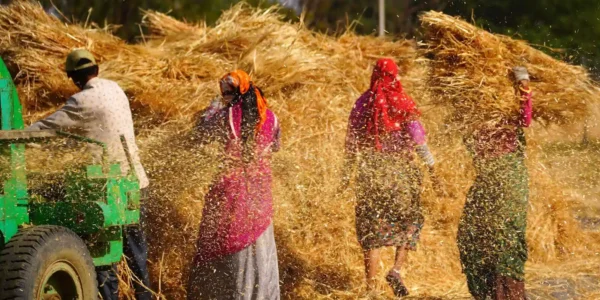India bans wheat exports, cites food security and soaring prices!
India has banned exports of wheat effective immediately, citing a risk to food security, partly due to the war in Ukraine and as a scorching heatwave curtailed output and domestic prices hit a record high.
Although not one of the world’s top wheat exporters, India’s ban could drive global prices to new peaks given already tight supply, hitting poor consumers in Asia and Africa particularly hard.
Agriculture ministers from the G7 industrialized nations immediately condemned India’s decision on Saturday.
If everyone starts to impose export restrictions or to close markets, that would worsen the crisis, German agriculture minister Cem Ozdemir said at a news conference in Stuttgart.
We call on India to assume its responsibility as a G20 member, Ozdemir said.
Government officials in New Delhi said on Saturday that India would still allow exports backed by already issued letters of credit and to countries that request supplies to meet their food security needs.
The ban would not be in perpetuity and could be revised, the officials told a news conference.
A spike in the global prices for wheat threatened the food security of India and neighboring and vulnerable countries, India’s Directorate of Foreign Trade said in a notice in the government gazette dated Friday.
Although there was no dramatic fall in India’s wheat output this year, government officials said that unregulated exports had led to a rise in local prices for the grain.
We don’t want wheat trade to happen in an unregulated manner or hoarding to happen, commerce secretary, BVR Subrahmanyam told reporters in New Delhi.
Wheat prices in India have risen to record highs, in some spot markets hitting 25,000 rupees ‘$320’ per tonne, well above the government’s minimum support price of 20,150 rupees ‘$260’.
It was not wheat alone. The rise in overall prices raised concerns about inflation and that’s why the government had to ban wheat exports, another senior government official who asked not to be named as discussions about export curbs were private.
For us, it’s an abundance of caution.
Ban is shocking
The ban is shocking, a Mumbai-based dealer with a global trading firm said.
We were expecting curbs on exports after two to three months, but it seems like the inflation numbers changed the government’s mind, the dealer said.
Rising food and energy prices pushed India’s annual retail inflation near an eight-year high in April.
India’s wheat harvest has also suffered from a record-shattering heatwave that is stunting production. Apart from weather hurting harvests, India’s vast stocks of wheat a buffer against famine have been strained by the distribution of free grain during the COVID-19 pandemic to some 800 million people.
India’s decision comes as global agricultural markets are under severe stress due to Russia’s invasion of Ukraine.
Ukraine, a traditional global breadbasket, has seen shipments disrupted, with the Ukrainian agriculture minister traveling to Stuttgart for discussions with G7 colleagues about getting its product out.
Before the Russian invasion, Ukraine exported 4.5 million tonnes of agricultural produce per month through its ports –12 percent of the planet’s wheat, 15 percent of its corn, and half of its sunflower oil.
But with the ports of Odesa, Chornomorsk and others cut off from the world by Russian warships, the supply can only travel on congested land routes that are much less efficient.
Some 20 million tonnes of wheat are currently sitting in Ukrainian silos and urgently needed to be exported, the German minister, Ozdemir, said, adding that the G7 spoke out against export stops and call, as well. for markets to be kept open.
He urged countries around the world not to take restrictive action that could pile further stress on the produce markets.


 For all latest news, follow The carefulu Google News channel.
For all latest news, follow The carefulu Google News channel.




